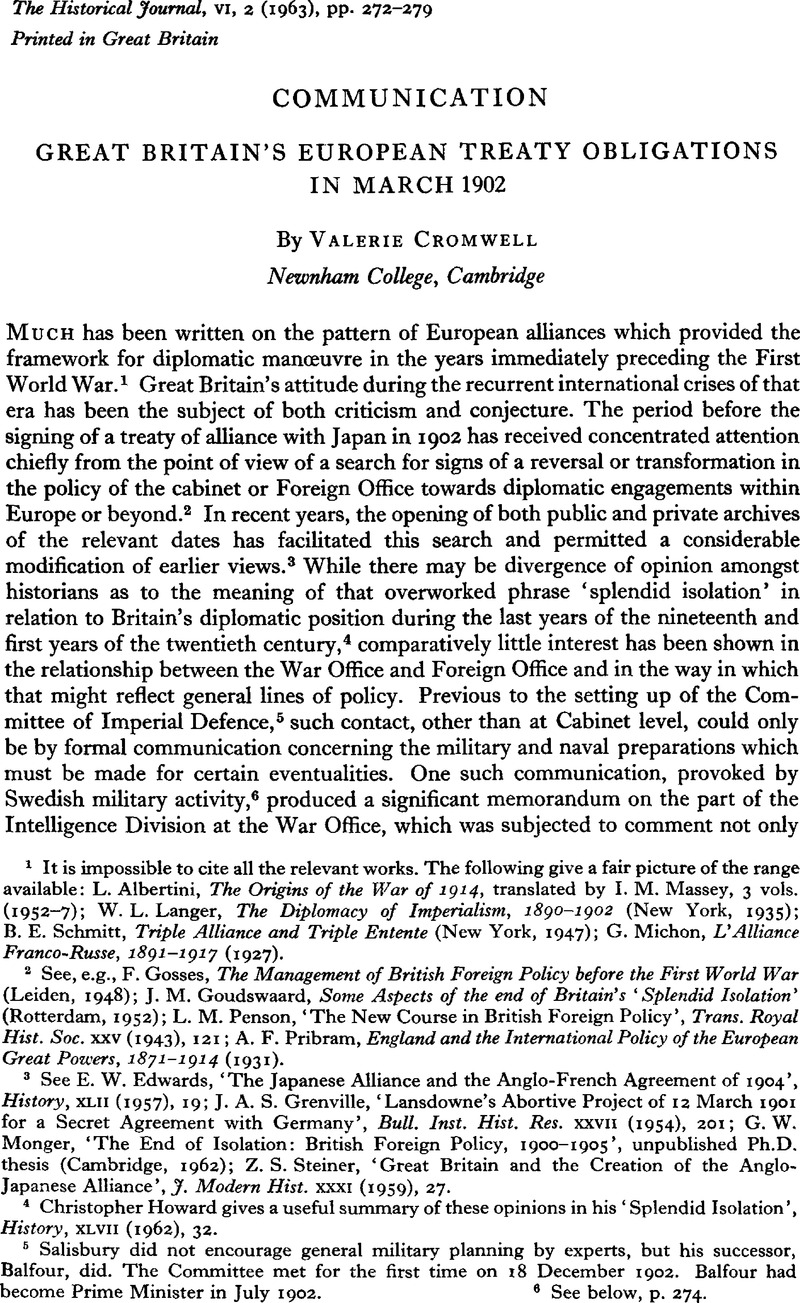Article contents
Great Britain's European Treaty Obligations in March 1902
Published online by Cambridge University Press: 11 February 2009
Abstract

- Type
- Communications
- Information
- Copyright
- Copyright © Cambridge University Press 1963
References
1 It is impossible to cite all the relevant works. The following give a fair picture of the range available: Albertini, L., The Origins of the War of 1914, translated by Massey, I. M., 3 vols. (1952–7)Google Scholar; Langer, W. L., The Diplomacy of Imperialism, 1890–1902 (New York, 1935)Google Scholar; Schmitt, B. E., Triple Alliance and Triple Entente (New York, 1947)Google Scholar; Michon, G., L'Alliance Franco–Russe, 1891–1917 (1927).Google Scholar
2 See, e.g., Gosses, F., The Management of British Foreign Policy before the First World War (Leiden, 1948)Google Scholar; Goudswaard, J. M., Some Aspects of the end of Britain's ‘Splendid Isolation’ (Rotterdam, 1952)Google Scholar; Penson, L. M., ‘The New Course in British Foreign Policy’, Trans. Royal Hist. Soc. xxv (1943), 121CrossRefGoogle Scholar; Pribram, A. F., England and the International Policy of the European Great Powers, 1871–1914 (1931).Google Scholar
3 See Edwards, E. W., ‘The Japanese Alliance and the Anglo–French Agreement of 1904’, History, XLII (1957), 19CrossRefGoogle Scholar; Grenville, J. A. S., ‘Lansdowne's Abortive Project of 12 March 1901 for a Secret Agreement with Germany’, Bull. Inst. Hist. Res. XXVII (1954), 201CrossRefGoogle Scholar; Monger, G. W., ‘The End of Isolation: British Foreign Policy, 1900–1905’, unpublished Ph.D. thesis (Cambridge, 1962)Google Scholar; Steiner, Z. S., ‘Great Britain and the Creation of the Anglo–Japanese Alliance’, J. Modern Hist, xxxI (1959), 27.CrossRefGoogle Scholar
4 Christopher, Howard gives a useful summary of these opinions in his ‘Splendid Isolation’, History, XLVII (1962), 32.Google Scholar
5 Salisbury did not encourage general military planning by experts, but his successor, Balfour, did. The Committee met for the first time on 18 December 1902. Balfour had become Prime Minister in July 1902.
6 See below, p. 274.
7 Public Record Office. W.O. 106/44. E. 1/6. Department of Military Intelligence and Operations, box 5. I am indebted to the Controller of Her Majesty's Stationery Office for permission to print this correspondence. (Crown copyright).
8 See Penson, L. M., ‘Obligations by Treaty: Their Place in British Foreign Policy, 1894–1914’, Studies in Diplomatic History and Historiography in Honour of G. P. Gooch, edited by Sarkissian, A. O. (1961).Google Scholar
9 Lt.–Gen. Sir W. G. Nicholson was the Director–General of Mobilization and Military Intelligence, which division was then installed at Winchester House, St James's Square. This department was organized in two parts, Mobilization and Intelligence. In the Intelligence section, Nicholson was assisted by three Assistants Quarter–Master–General, Col. J. K. Trotter, Lt.–Col. E. A. Altham and Brev. Lt.–Col. W. R. Robertson, all appointed in 1901.
10 See above, p. 273.
- 1
- Cited by




